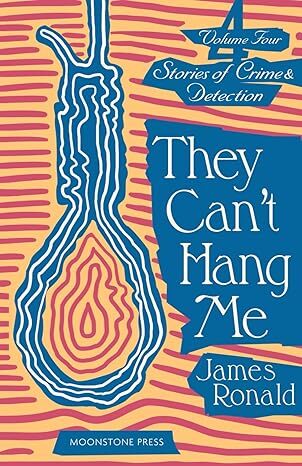They Can’t Hang Me

A review of They Can’t Hang Me by James Ronald – 240527
One of the finds for me in 2024, thanks to a wonderful series of reissues from Moonstone Press, is James Ronald and They Can’t Hang Me, the main course of the fourth collection of his works, originally published in 1938, is the best yet. The premise is that a former newspaper magnate, Lucius Marplay, believes that he was cheated out of his newspaper, the London Evening Echo, by four of his subordinates. Having suffered a nervous breakdown and been held in an asylum for twenty years on the grounds of suffering from homicidal delusions, Lucius has sworn to kill each of the four former employees, reasoning that if the authorities believe him to be insane they would not be able to hang him if he committed murder.
By the third chapter Lucius has managed to escape from the asylum in an masterly and ingenious way and makes his way to Fleet Street, pawning his psychiatrist’s overcoat for funds and to buy a rubber cosh, to wreak his reign of terror. Three of the gang of four are murdered, two of which are carried out despite a heavy police presence in an impossible murder style, and each are presaged by a death notice that appears in the mock ups for the next edition of the Echo. How has Marplay been able to pull off the murders and to insert the notices in the paper without anyone seeing him, except for a glimpse before the first murder, and despite the constant surveillance of the police, led by Superintendent Wrenn, or is there another explanation?
One of the book’s strengths is Ronald’s ability to create and describe convincingly the atmosphere within the newspaper office as the gang of four become increasingly more alarmed about their safety. Each respond to the crisis in their own different way, each believing that they will become the victims of an almost supernatural power, something that neither bricks nor the best efforts of the Yard can stop from wreaking its vengeance. It is powerful stuff.
There are some wonderful characters including Marplay’s daughter, Joan, and her maiden aunt guardian, the formidable Agatha Trimm. At the start of the book Joan learns about her father’s fate and is determined to find him and salvage his reputation. To do so she embarks upon a desperate course that almost leads to her downfall and is helped by the paper’s gossip columnist, the suave Lord Noel Stretton, an opportunity for Ronald to introduce a bit of romantic interest.
However, the stand-out characters are Flinders, once the star of Fleet Street and now an alcoholic wreck who is eventually killed because of what he knows, and an investigator with a dodgy Scottish accent, Alastair MacNab, who burst on to the scene and is rather more than he lets on to be. These are vibrant character creations and allow Ronald to lighten the tone of the book while keeping the plot moving at pace.
The story is not fairly clued, important pieces of information just being dropped into the narrative not least the tontine nature of the agreement between the four owners of the Echo, but this is much more of a psychological thriller than a conventional murder mystery. The attitude of one of the gang of four to their impending doom suggested to me that there was more going on than met the eye and so the major twist at the end was not so unexpected but nevertheless made for a dramatic ending.
It is fair to say that Superintendent Wrenn made a hash of the case, being too trusting of what he was told, missing signs of Marplay’s initial whereabouts which Joan easily picked up, and suffering the indignity of having two people murdered right in front of his eyes. No wonder he considered his position. However, there was no master sleuth to highlight the police’s inadequacies, events rolling on to their natural conclusion until Wrenn twigged what was really behind the murders.
Structurally, the book exhibits a nice piece of ring composition, something I am always a sucker for, opening and ending with two old buffers sitting in deck chairs discussing the affairs of Lucius Marplay. This is a great book, not without its imperfections, but written with such great vim and brio that you are carried along with it all and are desperate to see how it all ends.
As an added bonus, the Moonstone Press reissue includes three of Ronald’s short stories. I am already looking forward to volume five.



